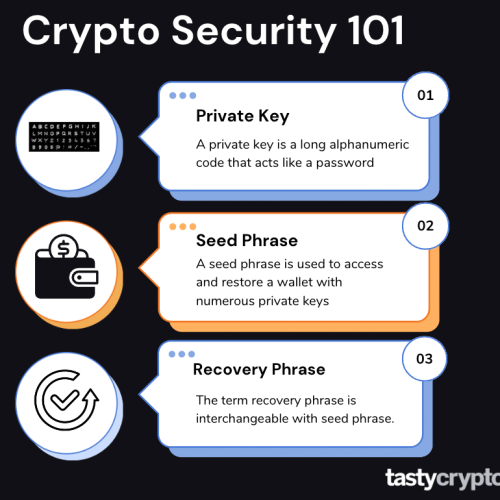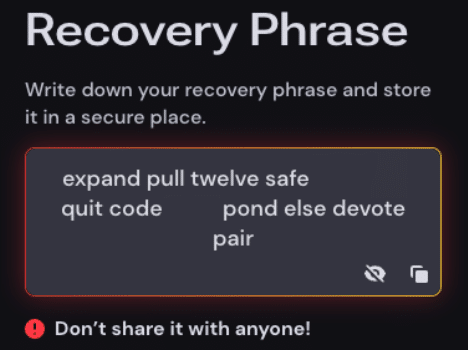A private key, also known as a secret key, is a mathematical key that is used with an algorithm to encrypt and decrypt data. A seed phrase, AKA recovery phrase, is a series of words used to restore access to multiple private keys in a self-custody wallet.
Written by: Mike Martin | Updated September 5, 2024
Reviewed by: Ryan Grace
Fact checked by: Laurence Willows

In cryptocurrency, security is everything. In this article, we’ll explain the difference between private keys, seeds phrases, and recovery phrases, all of which help you to safeguard digital assets stored in a self-custody wallet.
In short, seed phrases represent private keys in a different, easier-to-manage format. Seed phrases are used to access and restore a crypto wallet, which can in turn contain thousands of private keys!
⚠️ Spoiler alert: A seed phrase is the same thing as a recovery phrase.
🍒 tasty takeaways
A private key is a long string of digits that gives its owner access to cryptocurrency on a specific blockchain address.
A seed phrase is typically a set of 12 random words that is used to garner access to a self-custody wallet. An infinite number of private keys can be stored under a single seed phrase.
The term recovery phrase is another way of saying seed phrase.

What is a Self-Custody Wallet?
There are two ways for crypto market participants to store their digital assets: on exchanges and in self-custody wallets.
On centralized exchanges like Coinbase, a centralized entity maintains custody over your digital assets. They do this by maintaining possession of your private key(s). The downside here is there is no way for you to be assured your exchange is indeed holding your crypto 1×1 and not trading on it, as was the case with FTX.
When you store your crypto in a self-custody wallet, you alone have access to your private key, which represents your digital assets on a blockchain network like Ethereum or Bitcoin. Self-custody wallets can be either hardware wallets (USB drives) or software wallets (ios and Android mobile wallets). Hot wallets are always connected to the internet while cold wallets are offline. Additionally, self-custody wallets allow for the storage of non-fungible tokens, or NFTs.
🍒 Go In-Depth: What Are Self-Custody Wallets?
What is A Private Key?
📖 Private Key Definition: A private key is a code that gives its owner complete control over their digital assets on a specific blockchain address.
In blockchains like Bitcoin and Ethereum, a private key is an extremely long string of numbers and letters (256 digits long) that represents crypto ownership. Private keys serve as the foundation for accessing cryptocurrency and signing crypto transactions.
Private keys play a vital role in generating public keys, which, in turn, generate wallet addresses. Both private and public keys are created any time a new blockchain address is created.
While public and private keys are mathematically linked together, it is important to note that a private key can never be derived from a public key.
Private and Public Key Examples
A public key can be compared to a mailbox: the encrypted address is visible to anyone, allowing them to send crypto to it. However, only the individual in possession of the private key, acting as the key to the mailbox, can unlock and access the messages (cryptocurrency) stored within.
What is A Seed Phrase?
📖 Seed Phrase Definition: A seed phrase is a series of words used to access and restore a cryptocurrency wallet with numerous private keys.
As we noted above, a private key is an extremely long string of numbers and letters that represents crypto ownership on a blockchain.
Depending on how many crypto coins you own, you may have dozens of private keys. To simplify the process of accessing your private keys, wallet providers (like tastycrypto) use seed phrases to make the process more practical. Seed phrases are also referred to as mnemonic phrases.
Seed phrases are typically 12 randomly selected words that give you access to your crypto wallet and all of the private keys within it from a single interface.
If you have your seed phrase, you do not need your private key(s). They are algorithmically linked together. A seed phrase, therefore, acts more like a ‘master key’.
Crypto wallets with seed phrases make it easy to interact with decentralized applications, or dApps, in Web3. Decentralized crypto exchanges like Uniswap are among the most popular dAps.
What is A Recovery Phrase?

📖 Recovery Phrase Definition: Another name for a seed phrase generated by a crypto wallet provider.
Seed phrases and recovery phrases are used interchangeably. The term ‘recovery phrase’ is often substituted for ‘seed phrase’ as this term is understood easier by those new to crypto.
Additional Reading
Private Key and Recovery Phrase – What’s the difference? Ledger
FAQs
Though you do not need a seed phrase if you have a private key, seed phrases help for both organizational and security reasons. If you need to move your crypto assets to a different device, for example, having to write down a 256-bit number can be a tedious process. Additionally, it is far easier to accurately write down (and even memorize) a seed phrase. Additionally, private keys can be regenerated with a seed phrase.
BIP39 (Bitcoin Improvement Proposal 39) is a standard for Bitcoin wallets that enables crypto wallets to generate easy-to-read mnemonic phrases as a backup for cryptographic keys.
When a seed phrase undergoes a process called “derivation,” it enters a mathematical algorithm called a key derivation function, which then creates a private key along with its own unique address.
No. A private key is a code similar to a bank account password that grants control over crypto funds, while a recovery phrase is a set of words used to restore a wallet. Seed phrases do, however, store private keys and act like master locks in this regard.
In theory, a seed phrase can generate an infinite number of private keys.
If someone steals your seed phrase, they will be able to access any cryptocurrency that is associated with that wallet. It is important to keep your wallet secure to keep it safe from hackers.
No, a recovery phrase is not the same as a private key. Private keys give access to just one blockchain address, while seed phrases provide access to all private keys within a self-custody crypto wallet.

Mike Martin
Mike Martin formerly served as the Head of Content for tastycrypto. Before joining tastycrypto, Michael worked in the active trader divisions of thinkorswim, TD Ameritrade, and Charles Schwab. He also served as a writer and editor for projectfinance.
Michael has been active in the crypto community since 2017. He holds certifications from Duke University in decentralized finance (DeFi) and blockchain technology.
🍒 tasty reads


The Core Blockchain and DeFi Ecosystem: What You Need to Know

7 Best DePIN Crypto Projects

What Is Symbiotic and How Does It Work in 2024?

Ethereum vs Ethereum ETFs – 5 Major Differences

